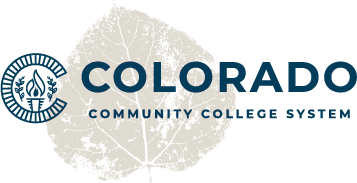CCCS News
CCCS leadership brief business and community leaders on workforce development initiatives
Chancellor Joe Garcia briefed business and community leaders on workforce development initiatives at a virtual presentation Wednesday, elevating the Colorado Community College System (CCCS) as the partner of choice for industry executives.
Organized by the Foundation for Colorado Community Colleges, the briefing brought together more than 100 business professionals to discuss industry and workforce solutions. The event was emceed by Christine Benero, CEO of Mile High United Way and a member of the Foundation’s CEO Advisory Cabinet that meets regularly with Chancellor Garcia on industry collaboration.
During the presentation, attendees watched a video message from Governor Jared Polis, heard updates on workforce initiatives underway across CCCS, and talked about ways to partner with CCCS’s 13 colleges. Here are key takeaways from the event.
Partnerships are more critical than ever.
In her opening remarks, Benero said now is the time for businesses to collaborate with community colleges—especially as Colorado emerges from the pandemic.
Working together, we can ensure Colorado builds back even stronger.
Governor Jared Polis echoed this urgency and said workforce development has been a top priority for his administration. He urged business leaders seek support from CCCS to maintain the state’s strong economic recovery.
“Our success tomorrow depends on the actions we take today, especially around human capital,” said Governor Polis in his video message. “We need to double-down on these critical partnerships to ensure lasting success for our state.”
Programs meet learners—and businesses—where they are.
In his remarks, Chancellor Garcia said CCCS offers the talent, programs, and vision to keep Colorado competitive over the long haul. With the pandemic upending many Coloradans’ lives—especially Coloradans of color who are already underrepresented in higher education—community colleges and industry will need to work together to get prospective employees back on track, he said.
“Collaborating with us means you get to shape your own talent pool,” Chancellor Garcia said. “You get to identify the exact skills and competencies workers need, and you can trust that they’ll make an impact on day one. That’s a win-win in today’s tight labor market.”
Collaborating with us means you get to shape your own talent pool.
To meet the needs of Colorado’s top industries, community colleges engage more than 208,000 K-12 and college students through its Career and Technical Education (CTE) programs each year, said Dr. Heath, who oversees the state CTE program. Learning directly from industry experts, CTE participants gain the skills needed to thrive in sectors as diverse as information technology, agriculture, and transportation. More than a third of courses under Colorado’s Concurrent Enrollment program—which allows high school students to earn college credit in high school—also count toward CTE credentials, Heath said.
Dr. Pirius, the vice chancellor for academic and student affairs, mentioned several new programs rolling out across the system. A consortium uniting community colleges in rural and frontier communities will allow Coloradans to earn a credential without leaving home in the coming years. The state’s Back to Work and Finish What You Started programs, funded by stimulus dollars, were modeled after a successful community college program and provide Coloradans the financial and academic support to return to school, earn a credential, and land a great job. Many colleges are offering these scholarships, he said.
Ways to Partners with CCCS
In his closing remarks, Chancellor Garcia said CCCS colleges stand ready to support Colorado businesses and outlined five ways to partner.
“We have the right people, the right expertise, and the right programs to meet this moment,” he said. “To continue to meet students where they are and support them along their education journey, we must take an all-hands-on deck approach. I hope you will join us.”
Get involved!
- Hire CCCS graduates: Business leaders can post job, apprenticeship, and internship openings on this Careers webpage that links to each college’s career center. Executives can also reach out to community college presidents directly to find prospective employees in specific technical or academic programs.
- Collaborate on programs: Industry leaders can join CTE Advisory Boards or reach out to community college presidents to suggest ways to improve programs. Visit the CTE website for more information.
- Leverage CCCS partnerships: Community colleges have deep relationships with K-12 school districts, workforce centers and four-year colleges and universities that can help meet regional workforce needs. Contact your local community college president for more information.
- Send employees to CCCS colleges for (re)training: CCCS specializes in earn while you learn models that provide future employees the real-world experience they need to be successful—and providing companies a productive talent pipeline. Tuition benefit programs can go further at a community college, too. To learn more about specific programs, fill out this inquiry form.
- Donate: Workforce development is one of the best investments we can make as a state. Whether its a donation to a local community college or the Foundation, dollars will help get students across the finish line and into the workplace.


